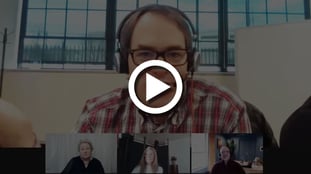Ask any travel manager about their confidence level in predicting and planning travel throughout the pandemic and you will hear stories of the stops and starts that have plagued business the past two years. Now, as COVID-19 cases sharply decline and restrictions ease across Canada, travellers are once again cautiously returning to the road.
 While travel managers can’t predict what might happen with future COVID waves or variants, they can shift away from a reactive mode and focus on the factors they can control to help keep road warriors safe and informed. To provide further guidance on this topic, Direct Travel sponsored the latest webinar in BTN’s Thought Leadership series, Owning What You Can Control in Today’s Fluid Travel Environment. Below, you can find our key takeaways for sharing with your team as well as a video recording of the webinar for streaming.
While travel managers can’t predict what might happen with future COVID waves or variants, they can shift away from a reactive mode and focus on the factors they can control to help keep road warriors safe and informed. To provide further guidance on this topic, Direct Travel sponsored the latest webinar in BTN’s Thought Leadership series, Owning What You Can Control in Today’s Fluid Travel Environment. Below, you can find our key takeaways for sharing with your team as well as a video recording of the webinar for streaming.
Balance the Strategic with the Tactical
Strategic planning is an integral part of a successful corporate travel program, but the disruptions created by the pandemic led businesses to scrap strategies that no longer made sense in order to focus on the tactics of day-to-day survival. This was particularly so for organizations with leaner teams and fewer hands on deck to help execute strategy.
As Carey Pascoe—Director, Global Travel and Card for Dolby Laboratories—pointed out during the webinar, travel managers spent the first part of the pandemic focused entirely on getting travellers home and creating approval processes to limit travel. Now, though, businesses are shifting from a “command and control” model to a “travel if comfortable” approach. With the tactical needs less pressing than before, travel managers have time to strategize and align their programs with broader corporate goals.
“This is where you have to take a step back,” said Pascoe. “It’s important that you work with your leaders to find time to talk to them and think about the future.”
These conversations are happening as companies evaluate how to restart their travel in a more thoughtful manner that prioritizes both the wellness of the traveller as well as the planet. According to Will Tate—a partner at GoldSpring Consulting—increasing sustainability now ranks in the top ten of biggest perceived changes to managing travel from pre-COVID to post-COVID. Throughout the travel planning process, travel managers can hold partners and travel suppliers accountable and educate employees regarding green practices.
Meet Employees on Their Level
Unsurprisingly, communication is an essential component travel managers can control. Not only communication, but truly listening to employees and fostering engagement to meet employees at the level they are at.
This is crucial as the workforce looks different than it did two years, particularly with regards to remote workers. Tate provided an example of a business that discovered more than 300 employees no longer lived in the locations ascribed to them in the company’s database. This change in location as employees move or go nomadic can influence a variety of travel factors, including preferred airports and options for driving personal cars or renting cars.
Travel managers need to work closely with HR departments to understand where employees are physically located at in addition to understanding where they are at in terms of their comfort level returning to the office and travelling again. Depending on how employee sentiment and traveller confidence has changed, consider increasing the flexibility of your policies to provide a sense of normalcy for your travellers.
“You need to meet employees where they are at and change your policies to support behavior that allows your people to deliver on the vision for your organization,” said Bridger McGaw, Executive Director of Global Security & Services for athenahealth. ”I think that’s the powerful cultural tool that travel managers have to make their travellers successful.”
By updating your policy and keeping it current, you instill confidence in your travellers and rebuild trust. In turn, they can take comfort on the road knowing that your business cares about their safety and has properly vetted partners and suppliers.
Find and Work with Expert Partners
The pressures on travel managers have built up over the pandemic, particularly for small and mid-sized companies. For travel managers to succeed, finding expert partners with advanced tools and technology is a critical factor to control.
“Your partnership is your strongest agreement you can build off of,” said Tate.
Both Pascoe and McGaw agreed, highlighting the importance of learning from your Travel Management Company (TMC) to get better information and apply that to your corporate travel strategy. Additionally, your TMC can provide tools for safety and security, which will be of use as the pandemic shifts to epidemic levels contained to select regions.
“I don’t need to be an expert in everything going on all over the world,” said McGaw. “I need to be an expert in knowing when to call my Travel Management Company.”
Besides safety and risk mitigation, having the right partner and tools in place can help as travel returns and drives demand higher. Tate identified technology like artificial intelligence as a way to save money, with businesses being able to use predictive pricing to get smarter about knowing when to buy. For more tips and takeaways, watch the webinar below to hear the full range of topics the travel experts discussed.


